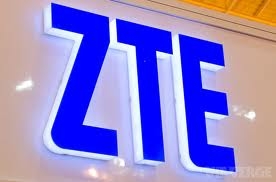China telecom giants threaten US: Congress panel
 A draft of a report by the House Intelligence Committee, obtained Sunday by AFP, said the two firms "cannot be trusted" to be free of influence from Beijing and could be used to undermine US security.
A draft of a report by the House Intelligence Committee, obtained Sunday by AFP, said the two firms "cannot be trusted" to be free of influence from Beijing and could be used to undermine US security.
The panel launched its probe over concerns that China could use the fast-growing firms for economic or military espionage, or cyber attacks.
"Based on available classified and unclassified information, Huawei and ZTE cannot be trusted to be free of foreign state influence and thus pose a security threat to the United States and to our systems," the draft document said.
Both Huawei and ZTE have denied any ties with the Chinese government. Top executives of the firms appeared at a hearing held by the panel last month, stressing that they were focused on business, not politics.
Huawei reiterated that position in response to queries.
"The integrity and independence of Huawei's organization and business practices are trusted and respected across almost 150 markets," Huawei vice president William Plummer said in an emailed statement.
"Purporting that Huawei is somehow uniquely vulnerable to cyber mischief ignores technical and commercial realities, recklessly threatens American jobs and innovation, does nothing to protect national security, and should be exposed as dangerous political distractions."
ZTE did not immediately respond to requests for comment.
The committee said both companies failed to provide adequate answers to lawmakers' questions about their relationship with the Chinese government.
"China has the means, opportunity and motive to use telecommunications companies for malicious purposes," said the report, due to be published Monday.
Based on its investigation, the panel said US authorities "must block acquisitions, takeovers or mergers involving Huawei and ZTE given the threat to US national security interests."
The panel said the US should even consider extending the authority of a super-secret panel that reviews foreign acquisitions to include purchasing agreements.
US government systems, particularly sensitive ones, should not include Huawei or ZTE equipment -- not even component parts -- nor should those of government contractors working on sensitive US programs, it said.
The report also said private US firms "are strongly encouraged to consider the long-term security risks associated with doing business with either ZTE or Huawei for equipment or services."
Because of the lack of clear information on how the companies operate, the committee report said they could be used for "malicious Chinese hardware or software implants" that could serve as "a potent espionage tool."
The committee said it received what appeared to be authentic internal Huawei documents showing the company provides "special network services to an entity the employee believes to be an elite cyber-warfare unit" in the Chinese military.
The 59-page draft report cited a host of other potential issues with the two firms, including unfair subsidies, allegations of bribery or corruption, dealings with Iran and ties with China's military and Communist Party.
In addition to the concerns cited by the lawmakers, the report said an unpublished, classified annex includes even more.
"That information cannot be shared publicly without risking US national security," it said.
House committee chairman Mike Rogers told the CBS program "60 Minutes" in a segment aired Sunday that he would urge American firms looking at doing business with Huawei to "find another vendor if you care about your intellectual property, if you care about your consumers' privacy, and you care about the national security of the United States of America."
The probe was called amid ongoing reviews around the world on whether the big firms are linked to the Chinese military or government.
Australia earlier this year blocked Huawei from bidding for contracts on its Aus$36 billion (US$36.6 billion) broadband plan due to fears of Chinese cyber attacks. In the US, Huawei was forced to back away from several investments amid pressure from Washington.
What the stars mean:
★ Poor ★ ★ Promising ★★★ Good ★★★★ Very good ★★★★★ Exceptional
Related Contents
Latest News
More News
- State corporations poised to drive 2026 growth (February 03, 2026 | 13:58)
- Why high-tech talent will define Vietnam’s growth (February 02, 2026 | 10:47)
- FMCG resilience amid varying storms (February 02, 2026 | 10:00)
- Customs reforms strengthen business confidence, support trade growth (February 01, 2026 | 08:20)
- Vietnam and US to launch sixth trade negotiation round (January 30, 2026 | 15:19)
- Digital publishing emerges as key growth driver in Vietnam (January 30, 2026 | 10:59)
- EVN signs key contract for Tri An hydropower expansion (January 30, 2026 | 10:57)
- Vietnam to lead trade growth in ASEAN (January 29, 2026 | 15:08)
- Carlsberg Vietnam delivers Lunar New Year support in central region (January 28, 2026 | 17:19)
- TikTok penalised $35,000 in Vietnam for consumer protection violations (January 28, 2026 | 17:15)

 Tag:
Tag:




















 Mobile Version
Mobile Version